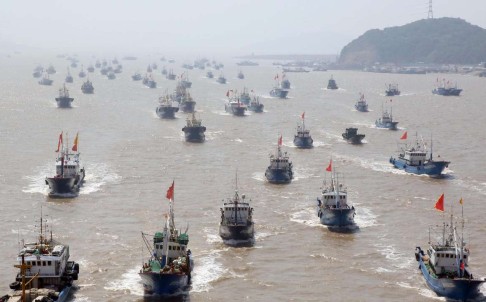Golez: The No. 1 lesson the proposed center should teach is to respect the ruling of the Arbitral Tribunal (Permanent Court of Arbitration) on the case filed by the Philippines against China.
China floats plans for international maritime legal centre
Proposal comes amid rising tensions with nation’s neighbours over disputed waters
PUBLISHED : Sunday, 13 March, 2016, 11:38pm
UPDATED : Monday, 14 March, 2016, 2:31am
Boats set out from Zhoushan, Zhejiang province, for the fishing grounds of the East China Sea. Photo: Xinhua
China will set up an “international maritime judicial centre” as it seeks to project its power at sea and territorial tensions rise with its neighbours.
The move was expected to improve Beijing’s expertise in legal issues and raise its profile in international arbitration, observers said.
Delivering a work report at the National People’s Congress on Sunday, Supreme People’s Court chief Zhou Qiang said China would improve the work of its maritime courts. Courts across China should work to implement the goal of building the nation into a “maritime power” and the “One Belt, One Road” strategy, he said.
“To resolutely defend national sovereignty, maritime rights and interests, and other core interests, we will strengthen our capacity in maritime cases and establish an international maritime judicial centre,” he said.
READ MORE: Crack international law team to join in China’s hunt for fugitives
Zhou gave no details about the centre but his report comes as China locks horns with Japan and Southeast Asian neighbours over claims in the East and South China seas.
The Philippines has filed a case with an arbitration court in The Hague over the disputes in the South China Sea, and a ruling is expected in May.
Beijing has refused to take part in the legal proceedings but the case has prompted calls for China to improve its approach to international law.
READ MORE: China dealt fresh blow in South China Sea disputes as Hague court to look into half of Philippines’ claims against country
Experts said the new maritime judicial centre would mainly handle economic cases, rather than public international law, which is at the core of the Philippines’ case in The Hague.
Maritime lawyer Wang Jing said a Chinese maritime court could arbitrate if, for example, two fishermen – irrespective of their nationality – were involved in a dispute in Chinese-controlled waters in the South China Sea.
In his report, Zhou said the Xiamen maritime court’s successful mediation in 2014 of a case involving a collision between a Chinese trawler and a Panama-flagged cargo ship near the Diaoyu Islands in the East China Sea demonstrated China’s jurisdiction over the region. Japan calls the islands the Senkakus and also claims sovereignty over the area.
Zhou said Chinese maritime courts handled 16,000 cases last year.
Wang said local maritime courts had handled more cases in recent years because their scope had expanded to cover development of ocean resources, tidal flats and land within a certain range of the shore. But many of these courts were not equipped to handle international cases. A higher level maritime centre would be better able to handle cases with foreign parties, he said.











No comments:
Post a Comment